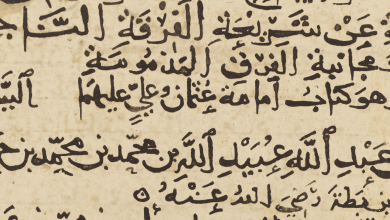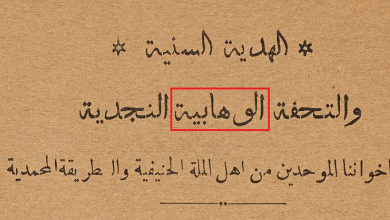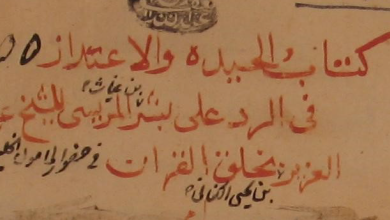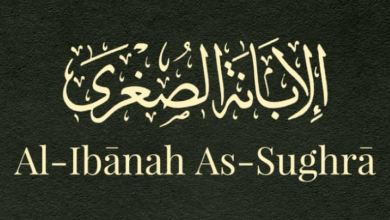TWO QUOTES FOR TAFWĪḌ AL-MAʿNĀ OF THE ṢIFĀT OF ALLĀH
In Islamic theological discourse, tafwīḍ al-maʿnā (delegation of meaning) concerning Allah’s attributes (ṣifāt) represents a significant methodological approach among traditional scholars. This position involves affirming the attributes mentioned in the Quran and Sunnah while delegating their precise meaning to Allah, avoiding both anthropomorphic interpretation and complete negation of their meanings.
This concept is well-illustrated in the work of Imam Najm al-Dīn al-Ghazzī (b. 977 AH – d. 1061 AH), who brought two quotes in his “Ḥusn al-Tanabbuh limā Warada fī al-Tashabbuh” (7/322-323). As a prominent 11th century AH scholar, his articulation of this principle represents the continuation of a well-established theological tradition that balances between affirming divine attributes while maintaining proper divine transcendence (tanzih).
The following quotes demonstrate how classical scholars approached this delicate theological matter, maintaining both scriptural fidelity and theological precision.
Online source: app.turath.io/book/14592?page=3775
Quotes:
قال الشيخ الجد في ألفيته «الجوهر الفريد»: [من الرجز]وَنُثْبِتُ الَّذِي أَتَى مِنْ مُشْكِلِ … فِي سُنَّةِ وَفِي كِتابٍ مُنْزَلِ
مُنَزِّهِينَ اللهَ عَنْ تَمْثِيلِ … مُقَدِّسِينَ فِيهِ عَنْ تَعْطِيلِ
كَالْيَدِ وَالْوَجْهِ وَسَمْعٍ وَبَصَرْ … وَالرَّوْحِ وَالنَّفْسِ وَعَيْنِ وَنَظَرْ
وَهَلْ يُفَوَّضُ إِلَيْهِ الْمُشْكِلُ … سُبْحانَهُ مِنْ ذاكَ أَوْ يُؤَوَّلُ
وَالأَعْلَمُ التَّفْوِيْضُ مَذْهَبُ السَّلَفْ … وَالأَحْكَمُ التَّأْوِيْلُ مَذْهَبُ الْخَلَفْ
وَلَيْسَ شَيْءٌ مِثْلَهُ مُحَقَّقا … وَهُوَ السَّمِيع وَالْبَصِيرُ مُطْلقًا
وأجاد الحافظ العلامة جلال الدين السُّيوطي رحمه الله تعالى في قوله: [من مجزوء الكامل المرفَّل]فَوِّضْ أَحادِيْثَ الصِّفاتِ وَلا تُشَبِّهْ أَوْ تُعَطِّلْ
إِنَّ الْمُفَوِّضَ سالِمٌ … مِمَّا تَكَلَّفَهُ الْمُؤَوِّلْ
Translation of the above quotes:
The Shaykh al-Jadd (grandfather, Muḥammad Raḍī al-Dīn al-Ghazzī, d. 935 AH) said in his poem “al-Jawhar al-Farīd” [from the Rajaz meter]:
We affirm what has come of the problematic [mutashābih] In Sunnah and in the revealed Book
While declaring Allah free from similitude and sanctifying Him from negation
Like the hand, face, hearing and sight and spirit, soul, eye and gaze
Should the problematic be delegated [tafwīḍ] To Him, glory be to Him, or interpreted [taʾwīl]?
And delegation [tafwīḍ] is more knowledgeable, the way of the predecessors [Salaf]
(Figurative) Interpretation [taʾwīl] is more precise, the way of the successors [khalaf]*
Nothing is like Him in reality And He is absolutely the All-Hearing, All-Seeing
And the learned scholar al-Ḥāfiẓ Jalāl al-Dīn al-Suyūṭī (d. 911 AH), may Allah the Most High have mercy on him, excelled in his saying [from the shortened al-Kāmil meter]:
Delegate (tafwīḍ] the hadiths of (the) attributes [ṣifāt of Allah]
And neither anthropomorphize [tashbīh] nor negate [taʿṭīl]
Indeed, the one who delegates [al-mufawwiḍ] is safe from what the interpreter [al-muʾawwil] has burdened himself with (1)
(1) Also quoted from al-Suyūṭī in “Shadharāt al-Dhahab” of Ibn al-ʿImād al-Ḥanbalī, d. 1089 AH (8/54).
Compiled by: Abul Hasan Hussain Ahmed






